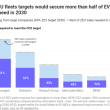A report by Aurora Energy Research warns that repealing certain incentives from the US Inflation Reduction Act (IRA) could result in $336 billion less investment, 237 GW less clean energy capacity, and a net loss of at least 97,000 American jobs by 2040 in the country’s competitive electricity markets, which account for about two-thirds of US power consumption.
The incoming administration has indicated a willingness to revisit technology-neutral clean energy policies established under the Inflation Reduction Act (IRA) and the Infrastructure Investment and Jobs Act (IIJA). Among the potential changes being considered is a revision of 48E, the technology-neutral Investment Tax Credit (ITC), and 45Y, the technology-neutral Production Tax Credit (PTC) for clean energy projects. Aurora’s report models a scenario where the ITC and PTC for wind, solar, and battery storage are removed, assessing the effects on investment, employment, and consumer electricity costs.
The report focuses on the potential removal of the technology-neutral Investment Tax Credit (ITC) and Production Tax Credit (PTC) for wind, solar, and battery storage projects. Without these credits, consumers could face an average 10% increase in household energy bills by 2040, with states like Texas seeing rises as high as 22%.
The report claims that removing ITC and PTC incentives would potentially slash $336 billion in renewable energy investments and cut 237 GW in clean energy capacity, equivalent to powering 35.7 million homes annually. States like New York and Texas face the steepest investment declines, losing $4.4 billion and $3.3 billion annually, respectively, through 2040. In Oklahoma, foregone investments could exceed 8% of the state’s 2023 GDP.
The repeal could eliminate 103,000 clean energy jobs, slightly offset by 6,000 additional fossil fuel jobs, resulting in a net loss of 97,000 jobs.
The analysis also points to substantial cost increases for consumers. Residential electricity bills could rise by $39 per month in New York and $29 in Texas, with households in Louisiana and Minnesota also facing notable hikes.
Oliver Kerr, Managing Director for Aurora Energy Research’s North American business said, “Clean, cheap, and reliable energy has always enjoyed broad support nationwide. Our modelling shows that continued support for clean energy tax credits is a sure way to create jobs, boost private sector investment, and keep energy bills low for American consumers – all while reliably meeting rapidly growing demand for power across the country.”















